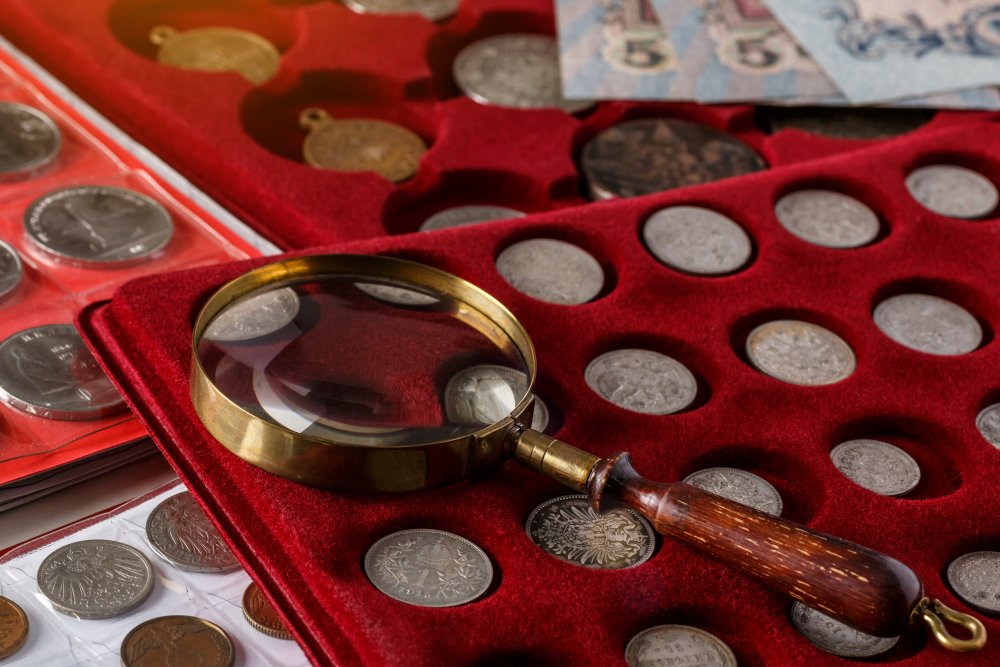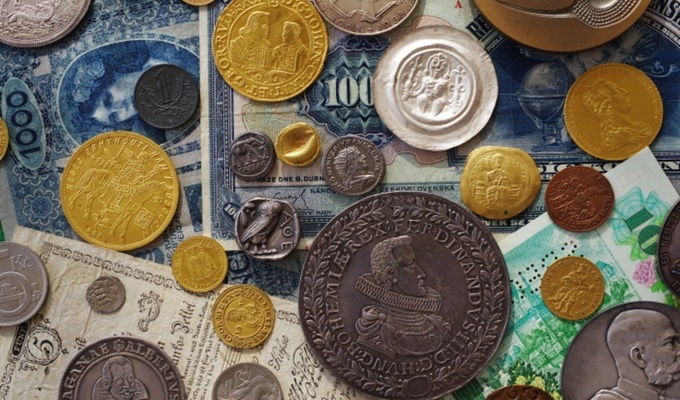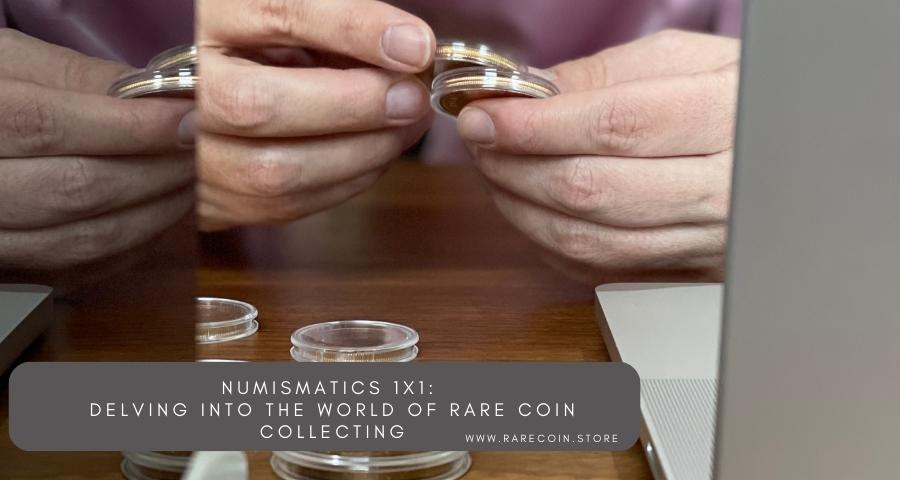The use of a database to conduct numismatic research related to central banks involves several key steps and considerations in order to efficiently analyse and gather information.
Database Selection: Look for databases that are specialized in financial information and numismatics like those provided by numismatic and academic libraries, or groups. Numista is one such example, as are the databases of the World Bank or academic journals repositories such as JSTOR.
The first step is to define your research goals. You might be looking for the history of coinage of a central bank in the economic policies reflected in coin design or the economic impact that numismatics can have on a nation. Make your search terms more specific to include keywords like "central-bank coins", "numismatics" and specific central-bank names.
Data Collection: Utilize the advanced searching capabilities of the database to search for relevant reports and articles. Locate historical records, policy papers, and catalogs of numismatics that detail coin types and minting locations.
Analyse: After you've gathered the relevant data, look for patterns and trends. Compare how different central banks approach coinage. Study the evolution of designs as time passes. You can find correlations between historical or economic developments and numismatic patterns.
Cross-References: Verify what you've found by cross-referencing the information in various databases. This will give you a complete understanding and minimizes the risk of relying on a few or biased data points.
Documentation. Be meticulous in your documentation, including sources and methodology. This documentation is crucial for professional or academic purposes and enhances the validity of your study.
Stay up to date The numismatic database as well as central bank policies evolve over time. Make sure to regularly check the database to stay informed about new research, updated catalogs of coins, and changes in central bank policy that could affect trends in numismatics.
These steps can help you gain the benefits databases offer to perform thorough research and gain valuable insight into the numismatics. This method allows for a systematic investigation of the historical and current aspects of the production and circulation of coins as well as the wider economic consequences of numismatics. Take a look at the recommended banknote authenticity for site info including coin holder, coin rarity, coin pressing, commemorative coins, banknote history, coin storage, proof, numismatic investment, treasury, dollar and more.

What Can I Do With Numismatics To Conduct Research On Mines?
Here's a method for conducting research like this: Database Selection: Choose databases that specialize in mining the past, mineral resources and the sourcing of metals to make coins. An organized approach is available to assist you in conducting this type of study. Examples of this type of study include geological surveys and mining companies' databases.
Define Research Focus: Specify your research objectives. You might be interested in mining techniques from various historical periods and historical mines that supply metals to coins or mining sites or understanding the significance of mining in numismatics. Find your area of focus to focus your research.
Search method: Use keywords for example "mining history," "coinage Metals," "historical Mines" and if appropriate particular metal names (such as gold, silver and copper) or geographic regions. Utilize advanced search options for filtering results by kind of document, date (such as mining reports, geological surveys) and mining method.
Data collection: Explore historical mines which produced coins made of metals. Obtain information on old mines that produced the coins with metals.
Review your data to find out the relationship between mining & numismatics. Find out how the quality of metal and availability affected coin production and the standards of coinage. Also, explore the economic impact of mining regions on the history of numismatics.
Cross-Referencing Verify findings by cross-referencing data between multiple sources or databases. This will ensure accuracy and the completeness of your research. It also provides complete information on mining activities which have impacted the field of numismatics.
Documentation: Document your findings thoroughly including citations to sources and a note of the methodologies you employed. Detail the databases used, search words, and relevance of sources to your questions.
Stay informed The latest discoveries and ongoing research may change mining records. Keep track of reports from geological surveys mining company reports as well as Numismatic research platforms to get the latest information on mining and the numismatics field.
Follow these steps to effectively explore numismatics and mines using databases. This technique allows for a thorough study of the mining practices of the past which provided the metals that were essential for the manufacture of coins. It also provides insights into the economic and technological factors influencing numismatic evolution. Have a look at the top coin collecting tips for more tips including banknote catalog, currency authentication, coin errors, banknote value, banknote production, currency, coin album, design, coin mold, banknote design and more.

How Do I Research Numismatics In Relation To The Legal Experts Using A Database For Numismatics?
For a structured method of conducting this research: This is a systematic method for conducting such research. Database Selection: Choose databases that focus on legal research, numismatic laws and court cases involving the numismatic issue, as well as academic papers on legal aspects of the numismatics. Legal research platforms such as Westlaw as well as LexisNexis are examples, along with the numismatic journals, publications of numismatic societies, and numismatic law journals.
Define Research Focus: Specify your research objectives. You might be interested in the legal guidelines for coinage and currency. Numismatic dispute. Regulations on coin production and circulation. Legal interpretations of authenticity and ownership. Find out what you're seeking to know in order to guide your exploration.
Search strategy: include legal terms like "numismatic dispute"," "legal aspects of coinage" and "numismatic issues" when you search for keywords. If applicable you can include legal terms such as authenticity, ownership or counterfeiting. Results of a search can be classified by date and jurisdiction (national and international,) and also the legal issues that pertain to the numismatic field.
Data Collection: Access to legal precedents like court decisions as well as legislative texts and academic articles regarding numismatic law. Data collection: Gather information like legal analyses, case summaries and interpretations of relevant laws as well as historical perspectives on legal issues relating to the numismatics.
Analyze: Understand the legal implications in numismatics by analyzing the data. Discover how legal frameworks can influence numismatic trading, collection management processes as well as authentication processes, and the international exchange of numismatic objects. Compare and contrast the legal interpretations of different jurisdictions as well as historical periods.
Cross-Referencing - Check the validity of your study by comparing the information from multiple databases, legal publications or court records, as well as academic publications. This lets you conduct accurate research and get the complete understanding of the law of numismatics.
Documentation: Record your findings systematically by citing sources and noting methodologies used. Note the details of the databases you have accessed, the keywords used to search, and the significance of every source you use to answer your research needs.
Stay Up-to-date: Numismatic legislation and legal interpretations are continuously changing with legislative changes as well as court decisions and other developments. Keep yourself up to date by checking updates in numismatic databases, legal databases, publications and numismatic society updates regarding legal developments.
You can use databases to research numismatics and experts in the field of law by following these simple steps. This approach allows for an in-depth analysis of legal structures as well as scholarly interpretations that intersect with the field of numismatics. Have a look at the top currency catalog info for site tips including currency society, banknote design, central bank, antique banknotes, krona, zloty, rial, banknote news, coin release, currency appraisal and more.

How Can I Learn More Information About Numismatics Through Online Forums And Communities Using A Numismatics Database?
This involves using online communities and forums which experts, enthusiasts, and collectors can share their expertise and discuss current trends or showcase their collections. A method that is structured is provided to guide you through this type of study. For instance, forums like CoinTalk, Reddit’s ‘r/Coins’, and numismatic communities in social media sites like Facebook groups, or LinkedIn.
Define Research Focus: Specify your research objectives. Are you looking to understand current trends in collecting, or discussing particular coins or historic periods, seeking guidance regarding authentication and grading or connecting to experts in the specialized fields of numismatics? Clarify your focus to direct your search.
Search Strategy: Use keywords that are related to the subject of your interest, including "numismatic forum," "coin collecting community,"" "online discussions on Numismatics" and keywords that pertain to specific topics (ancient coins or contemporary coins) or keywords that relate to the research question. Use the search functionality on each platform to find relevant threads and forums.
Data Collection: Access discussions, threads, and posts within online communities. Find out information about collecting strategies coins, coin identification strategies markets, personal experiences with numismatic discoveries and discussions about historical or cultural aspects of coinage.
Analyze your data in order to understand the perspectives and experiences of those who belong to the online numismatic community. Examine the veracity of information by considering the knowledge of the contributors, the consensus between members on particular issues, as well as the depth of discussions.
Cross-Referencing. You can confirm your findings by comparing information from different forums. Compare insights to gain a broad perspective on collecting patterns, market trends or professional advice from the numismatics community.
Documentation: Document your findings thoroughly, citing specific threads, discussions, and contributors if required. Keep track of the most important insights and the opinions that are shared in online communities and forums.
Be Engaged: Participate in discussions actively and ask questions, then contribute to the discussion to gain insights and establish connections between the Numismatics. Stay informed with new threads.
The following steps can assist you in conducting effective research on numismatics by using online forums and community sites. This method lets you benefit from the collective wisdom and experience of a diverse collection of experts and collectors, providing valuable insights and perspectives on various aspects of collecting coins as well as identification and appreciation. Follow the best banknote marketplace recommendations for site info including banknote catalog, coin release, copyright detection, banknote rarity, dollar, currency exchange, currency dealer, coin identification, real, dollar and more.

How Do I Use A Database To Research Numismatics Regarding Industry Trends And Insights?
If you're looking for a more systematic approach, here's how to conduct a search like this: The following is a systematic way to conduct such research: Database selection: Choose databases that are specialized in market research and industry analysis as well as publications numismatic. Examples of this type of research include market research platforms (like Mintel and IBISWorld) as well as numismatic journals, industry specific databases, or business news sources.
Define Research Focus: Specify your research objectives. Do you want to know about the latest market trends, new collecting interests, technological advances affecting the field or economic factors that influence the value of your coins? Clarify your goals to help guide your search.
Search Strategy: Use keywords like "numismatic industry trend, "coin-collecting market analysis," and "emerging trends in Numismatics." Include specific subjects, (ancients coins, moderns coins or paper money), keywords or phrases that are related to the question you are researching. Use advanced search features to sort results by dates, industries, and type of publications (reports and articles, or market analyses, etc.).
Data collection: Get insight and details on the numismatics. Find out information about market research report on the latest trends in coin collecting and articles on technological advancements (like digital cataloging tools, authentication technologies) Expert opinions on market volatility and economic studies that affect the numismatic market.
Analyze and interpret the data to gain key insight into the numismatics business. Assess market dynamics like trends in collector demographics, shifts in collecting preference (historical periods or themes) as well as the advancements in numismatic technlogy, and the impact of global economic factors on demand for coins and values.
Cross-Referencing - Check your findings using information from multiple databases, market-research reports, publications from numismatic societies, and articles about analysis of the industry. This ensures reliability and completeness in your research, providing a comprehensive view of market trends and information.
Documentation - Document your research findings in a systematic manner, noting sources and methods. Detail the databases used, search words, and the relevancy of your sources to your question.
Keep updated Keep up-to-date: The numismatics business changes constantly, as are the current trends. This includes changes to the market and trends in collecting and technological advancements. Stay up-to-date by following updates from the market research team, numismatic journals and industry reports.
Follow these steps to uncover the latest trends in numismatics and gain valuable insight. This approach enables you to gain valuable perspectives on market dynamics, collectors' preferences technological advances, as well as economic influences within the numismatic field, providing insights that are crucial for collectors, investors, and numismatic collectors alike. See the top coin storage url for website advice including euro, banknote collection, rare banknotes, coin collecting, banknote holder, real, pound, mint, currency exchange, gold coins and more.
